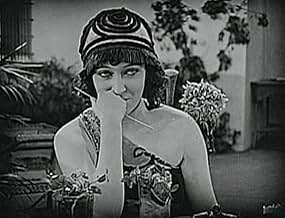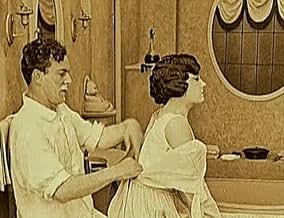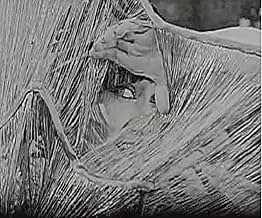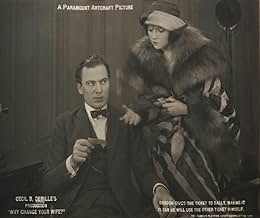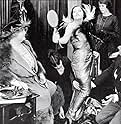Füge eine Handlung in deiner Sprache hinzuRobert and Beth Gordon are married but share little. He runs into Sally at a cabaret and the Gordons are soon divorced. Just as he gets bored with Sally's superficiality, Beth strives to imp... Alles lesenRobert and Beth Gordon are married but share little. He runs into Sally at a cabaret and the Gordons are soon divorced. Just as he gets bored with Sally's superficiality, Beth strives to improve her looks. The original couple falls in love again at a summer resort.Robert and Beth Gordon are married but share little. He runs into Sally at a cabaret and the Gordons are soon divorced. Just as he gets bored with Sally's superficiality, Beth strives to improve her looks. The original couple falls in love again at a summer resort.
- Regie
- Drehbuch
- Hauptbesetzung
- Doctor
- (as Clarence Geldart)
- Naval Officer at Hotel
- (Nicht genannt)
- Party Guest Dozing
- (Nicht genannt)
- Girl in Bathing Suit
- (Nicht genannt)
- Sally's Maid
- (Nicht genannt)
Empfohlene Bewertungen
After the divorce Swanson overhears two women gossiping about her in the next changing room. She decides to "jazz up her lingerie" and win the husband back. Of course they all end up at the same Atlantic City hotel where the transformed Swanson (what a bathing suit!) catches his eye anew. Through a series of plot twists, including the manic cat fight between the two women with threats of throwing acid, poor Bebe concedes defeat and (after emptying his wallet of cash) leaves him to Swanson.
Good fun and all 3 stars are terrific. Also taking center stage are the women's fashions (hilariously "exotic") and the interior decor. DeMille was the first director to understand the importance of film as a TREND SETTER and basically created the product endorsement mania so prevalent in today's films.
Sylvia Ashton is Aunt Kate, Theodore Kosloff is the violinist, Lucien Littlefeld is the butler, and William Boyd is one of the hotel guests. The hotel is quite a spot, and mention should be made of the cat and dog fight which presages the battle between Swanson and Daniels. The dog is funny, and the cat is named Toodles, which was the name of the home wrecker played by Julia Faye in the preceding "marriage" film: Don't Change Your Husband.
Young matron Gloria Swanson is barely 20 but she might as well be 50 the way she dresses and with that nagging, sour attitude of hers. She whines when her husband's dog is indoors, complains about his choice in music, and basically has turned into a fussy aunt. Husband Meighan's attempts at affection are rebuffed and in desperation he decides to buy a sexy gown for her, falling into the lair of vampy clothes model BeBe Daniels. BeBe manages to break up their marriage before Gloria can blink those legendary blue eyes and Meighan scarcely has a moment to breathe before he finds himself in yet another marriage and this one more troublesome than the first.
The cast is terrific here; beautiful, chic Gloria is remarkably believable as the young woman who has gotten old before her time. Thomas Meighan is excellent as the husband who goes from being one wives' puppet to a similar role with the second missus. Silent movie fans who are more familiar with the later silent career of Meighan (actually less than a decade away) when he was a more austere screen presence may be surprised how dashing he was at this point in his career and very much a matinée idol. BeBe Daniels is absolutely delicious as the tramp who ultimately decides "the best thing about marriage is alimony". This delightful romantic comedy stills packs quite a punch after some 90 years.
The movie isn't entirely cynical about romanceit is never really in doubt that Beth and her husband love each otherbut it is shrewd enough to recognize that in holding the attention of your partner a little glamour and sophistication doesn't hurt (the husband isn't let off the hook though, and his naiveté in expecting the honeymoon phase to last forever is mocked in a bathroom scene when Sally repeatedly interrupts his attempts to shave just as Beth did earlier).
A side note: All the leading players are engaging, but the violinist (played by Theodore Kosloff) who seduces women by making love to their souls steals every scene he is in.
To sum up, this worldly comedy challenges the common assumption that silent film is little more than slapstick or melodrama.
This is a great romp, getting better with every scene. It is not good to women, though, making them out to be selfish and catty. It also makes it seem that a woman's role is to be beautiful for her man, and if she isn't, he practically has the right to leave her. I mean, come on now!
The leads (three of them) are all first rate. The man is a charmer, really convincing and natural, Thomas Meighan. His wife (at first) is Gloria Swanson, a silent screen staple (especially for director Cecil B. de Mille who directed six straight films with Swanson, including the parallel, Don't Change Your Husband (1919). But the third other woman is Swanson's match, Bebe Daniels, and if she isn't as famous, it's only because time is fickle.
Because the three are so well balanced, both in ability and in the way they are given time together (in all three possible combinations, plus all three of them together), the film really builds momentum well. The modernity of flipping wives was probably part of the racy appeal, and it might seem a little staid by our standards, where there is (sometimes) less gravity to a marriage.
Music is key, which might seem odd for a silent film, but by showing us the 78 records being put on, the audience knows what the soundtrack would be. (The actually sound tacked on to my DVD version of this film is a brutal melange of found orchestral pieces that cut in and out, hither and tither.) For those interested in the actual piece called Hindustan that is key in three scenes (and key to the changing sentiments of the women) go to www.archive.org/details/JosephC.SmithsOrchestra-01-07 and you can actually click on piece to hear it (a lively pre-jazz dance type number).
So is this a pertinent film? In a way, it is. It's basic theme of paying attention to what your mate needs, and appreciating their attentions, is pretty timeless. But in other ways the film is sadly, painfully retrograde, and it isn't just because it's 1920. The way the women vie for the man, and the way he lets them, and ultimately the way he treats the Daniels character (who does him no wrong any more than the Swanson one does), is just cheap and tossed around for comedic purposes. Which is how you can take it and enjoy it. More than you'd expect.
Wusstest du schon
- WissenswertesFor a silent movie, music plays an important part in it, with a private music recital and a public orchestra performance giving the mood for two scenes. Most significantly, music records with three different types of music are prominently displayed in the hands of two main actors, and are intrinsic to the story development.
- Zitate
Beth Gordon: Do you expect *me* to share your Oriental ideas? Do you want your *wife* to lure you like a - a - Oh why didn't you marry a Turk?
- VerbindungenFeatured in Hollywood - Geschichten aus der Stummfilmzeit (1980)
- SoundtracksHindustan - Fox Trot
By Oliver G. Wallace and Harold Weeks
Interpreted by Joseph C. Smith's Orchestra
Published by Victor 18507-A
Top-Auswahl
Details
- Laufzeit
- 1 Std. 30 Min.(90 min)
- Farbe
- Sound-Mix
- Seitenverhältnis
- 1.33 : 1



